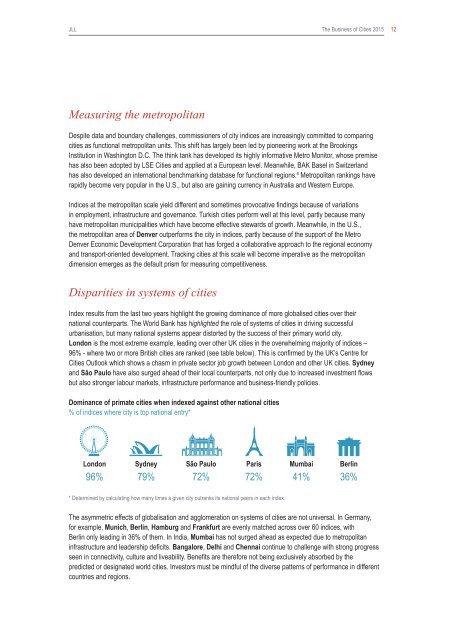jll-business-of-cities-report
jll-business-of-cities-report
jll-business-of-cities-report
Create successful ePaper yourself
Turn your PDF publications into a flip-book with our unique Google optimized e-Paper software.
JLLThe Business <strong>of</strong> Cities 2015 12Measuring the metropolitanDespite data and boundary challenges, commissioners <strong>of</strong> city indices are increasingly committed to comparing<strong>cities</strong> as functional metropolitan units. This shift has largely been led by pioneering work at the BrookingsInstitution in Washington D.C. The think tank has developed its highly informative Metro Monitor, whose premisehas also been adopted by LSE Cities and applied at a European level. Meanwhile, BAK Basel in Switzerlandhas also developed an international benchmarking database for functional regions. 6 Metropolitan rankings haverapidly become very popular in the U.S., but also are gaining currency in Australia and Western Europe.Indices at the metropolitan scale yield different and sometimes provocative findings because <strong>of</strong> variationsin employment, infrastructure and governance. Turkish <strong>cities</strong> perform well at this level, partly because manyhave metropolitan municipalities which have become effective stewards <strong>of</strong> growth. Meanwhile, in the U.S.,the metropolitan area <strong>of</strong> Denver outperforms the city in indices, partly because <strong>of</strong> the support <strong>of</strong> the MetroDenver Economic Development Corporation that has forged a collaborative approach to the regional economyand transport-oriented development. Tracking <strong>cities</strong> at this scale will become imperative as the metropolitandimension emerges as the default prism for measuring competitiveness.Disparities in systems <strong>of</strong> <strong>cities</strong>Index results from the last two years highlight the growing dominance <strong>of</strong> more globalised <strong>cities</strong> over theirnational counterparts. The World Bank has highlighted the role <strong>of</strong> systems <strong>of</strong> <strong>cities</strong> in driving successfulurbanisation, but many national systems appear distorted by the success <strong>of</strong> their primary world city.London is the most extreme example, leading over other UK <strong>cities</strong> in the overwhelming majority <strong>of</strong> indices –96% - where two or more British <strong>cities</strong> are ranked (see table below). This is confirmed by the UK’s Centre forCities Outlook which shows a chasm in private sector job growth between London and other UK <strong>cities</strong>. Sydneyand São Paulo have also surged ahead <strong>of</strong> their local counterparts, not only due to increased investment flowsbut also stronger labour markets, infrastructure performance and <strong>business</strong>-friendly policies.Dominance <strong>of</strong> primate <strong>cities</strong> when indexed against other national <strong>cities</strong>% <strong>of</strong> indices where city is top national entry*London Sydney São Paulo Paris Mumbai Berlin96% 79% 72% 72% 41% 36%* Determined by calculating how many times a given city outranks its national peers in each index.The asymmetric effects <strong>of</strong> globalisation and agglomeration on systems <strong>of</strong> <strong>cities</strong> are not universal. In Germany,for example, Munich, Berlin, Hamburg and Frankfurt are evenly matched across over 60 indices, withBerlin only leading in 36% <strong>of</strong> them. In India, Mumbai has not surged ahead as expected due to metropolitaninfrastructure and leadership deficits. Bangalore, Delhi and Chennai continue to challenge with strong progressseen in connectivity, culture and liveability. Benefits are therefore not being exclusively absorbed by thepredicted or designated world <strong>cities</strong>. Investors must be mindful <strong>of</strong> the diverse patterns <strong>of</strong> performance in differentcountries and regions.


